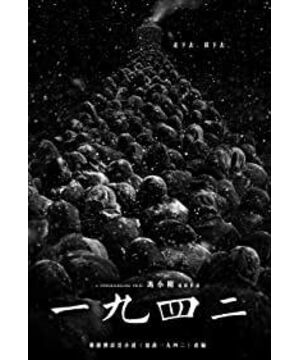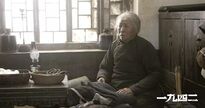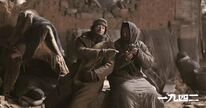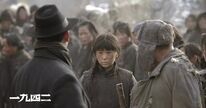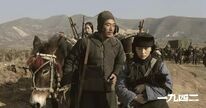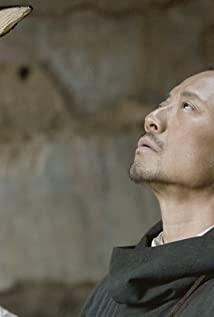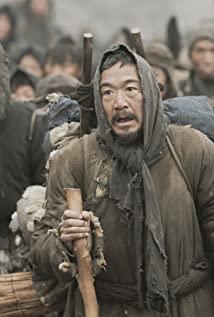This movie is better than I imagined. It is beyond imagination. First, I generally have low expectations for domestic blockbusters. Second, the theme of 1942 is too big. Correspondingly, it will be much more difficult to control. I have a deep understanding of this. Many blockbusters have been scolded for this reason. They have too much ambition, too big a pattern, left sides and right sides, and frequent flaws. At the same time, low-cost, small-angle, and small-themed films tend to be brilliant and easy-going. Comparing the two on the same scale is inherently biased. A director who has a good grasp of a familiar field and a local area will have higher requirements for his skills when facing the theme and perspective of a national nature. Before I could organize my thoughts carefully, I watched Liu Zhenyun's "Revising the Old 1942". There are two key points: the disaster situation in 1942, the role and role of the Kuomintang government in the whole process. Moving to the big screen, the line drawing needs to be three-dimensional, and the narration needs to have a standpoint. In 146 minutes, not only the beginning and end of the drought, but also the life of all social classes must be clearly depicted. I also need to tell everyone, what do you want to convey under the tragic situation of starvation everywhere? What does the actions of the authorities reflect? Otherwise it becomes a documentary. At the beginning of the film, there is a narration, saying that in 1942, there was a severe drought in my hometown, and at the same time, things like Song Meiling's visit to the United States, Gandhi's hunger strike, the bloody battle in Stalingrad, and Churchill caught a cold. At that time, I slandered and said, this is another posture for foreigners to see, right? This is the case with many domestic films. As soon as the background of the story comes up, I will give you a simple explanation, for fear that you will not understand. When I was just taking a shower, I suddenly realized that this is a movie that is going to the theater, not just for you and me, but more for China, third- and fourth-tier cities, and the cultural level may not be that high. some people. Thinking of my mother, she is considered to be the most educated among middle-aged and elderly women. When I watched "October Besieged City", I still explained the multi-party forces only after the boss's speech was abolished. So you see, sometimes what you think is intentional may not really be someone else’s intentions. If we want to be a better version of ourselves, can we learn first, instead of trying to speculate on others with malice? Just because belief cannot explain it doesn’t mean that belief is useless. The process must be explained clearly and clearly. Leaving hometown, Luoyang, Tongguan, Shaanxi, returning. More than 100 days away. The main characters, who died, left, and disappeared, must be explained clearly. The old club, the provincial government, the army, the chairman of the committee, American journalists, Christians, and the circuit court all appeared on the stage, and there must be echoes before and after. It is not an easy task to tell this story clearly so that the general public can understand it. When Father Ban Lazi, played by Zhang Hanyu, appeared, I To say the least, it's so hard to have themes of religion and belief in this wartime movie. "Nanjing! "Nanjing" and "The Thirteen Hairpins of Jinling" are both talked about, and they all talk about snake heads and tails, and they are not white. Fortunately, it was handled lightly without too much entanglement. The reporter asked the priest if he knew about China. The priest said he couldn't understand why (why did this happen?) Xiao An asked the priest, is this what God arranged for people? The priest said it was the act of the devil. The information revealed here cannot be understood or explained by people in the social background of the innate human rights in the West, why natural disasters occur in China without the government's participation in solving them. This is a big question mark, what happened to China? Natural disasters are not scary, what is scary is that they are so severe that the government doesn't care about them? The scary thing is that people who have suffered from natural and man-made disasters (Japanese plane bombing) not only have no sympathy for the same enemy, but are killing each other? Who is this question mark asking? Is it the National Government in 1942, those whose remains are hard to find, or the ruling party today? Are you sitting in the cinema today? Ideal or reality? Chiang Kai-shek has a scene in the second half of the play where he confesses in the church, wiping the tears from his face. Don't say it's crocodile tears. Chen Daoming played really well. This is the first person in my memory who clearly knows that he is just an actor but can perform the kind of leader aura that takes your breath away in the play. He also said in the car that he missed the time when the Northern Expedition stood with the people and responded to each other. Yes, in 1942, when Churchill's cold became so important, when the army was going to fight for food and wages, there were some things he didn't know, but he had to sacrifice. There was a military band performance of soldiers orphans. After the Japanese withdrew, he issued an order for disaster relief. Don’t call him hypocrisy. Hypocrisy without a purpose is a waste. Politics itself is a very cruel thing. The price behind it is too great. The American reporter, who risked his life to film his way to escape from the desert, didn't think he was embarrassed when his donkey and food were stolen, but said, "My friend, brother, because of facing the horrific bombing scene, he took out his pistol and shot at the bomber." He later won the Pulitzer Prize for journalism. He was the part of the whole film that brought tears to my eyes. Idealists seek truth and truth. at the cost of life. Politicians pursue and defend the interests of the majority. Of course their own. Anyway, the last shell will fall on the rulers. The saddest thing is that we are inseparable from both. Criticizing then or insinuating now? Feng Xiaogang talked about officialdom in this movie. In the contest between the Henan provincial government and the army, the county magistrate entertained the chairman, and the chairman met the chairman. . Distributing earthquake disaster food, each department in charge is ambitious and selfish. Everyone is hiding and tacitly making money from national disasters. Are there any of these disturbing plots that make you want to scold your mother in the movie? This scene is all too familiar, you don't know whether he was bombarding the National Government led by Chiang Kai-shek in 1942, which finally settled in a corner of Taiwan, or the people's government that was demolished by corrupt officials and urban management? It's too familiar, and it's too easy to take a seat. In addition to scolding mother, can you have a little reflection on the environment and society you live in? The answer is yes, I think the meaning of this drama is there. Survival instinct or civilization and human nature? As the biggest mainline old club and long-term workers and family, the story is also very exciting. Victims crossing the border, white flour rice, a feast for thousands of people. It directly led to the Rush and the death of the eldest son. The whole family began to flee the famine (note that the old club's own statement here is to avoid disasters). The sense of superiority on the way to escape is gradually lost. In the end, like everyone else, they were completely reduced to extreme poverty. Before an existential crisis, the first step is to eliminate differences, in terms of wealth and class, and even in terms of concept and cognition. So the stars will look at the tie-post. Morality and dignity are then challenged. People were bought and sold like livestock, and Xingxing was sold as a young prostitute in exchange for 5 buckets of rice. The faces of her and her father were intertwined with helplessness and fleeting happiness. Huazhi can give up everything in order to survive. People rob people, soldiers kill people, without mercy. Survival is such a cruel topic, Ang Lee weaves such beautiful stories in the teenage pie to try to heal and repair the psychological trauma caused by the price of survival. So gentle and compassionate. But here, the 3 million starved people who died, dreaming day and night are too late to redeem. At the end of the film, my grandmother said, "I have forgotten about those things." There is no time to mourn, and relatives have already left one by one. In the face of the huge collective, the individual becomes small and insignificant. Heaven and earth are not benevolent, and all things are dogs. How to save yourself? Then the cat-loving star will still hard-heartedly cook the cat and say I want to drink a bowl of soup in the end. He would resolutely sell himself, not only to save his family, but also to find food for himself. Huazhi can sleep with people for two biscuits and sell herself for 4 liters of rice. Sitting in front of the computer, you love cats like your life, have you ever thought that no matter what, I will not leave my cat? Wake up, this is what the movie wants you to see. In a comfortable environment, our worldview comes from education and cognition, without cost. Think of the Rwandan genocide and what the Lucifer effect describes. Existential crises often bring about anti-humanity. Now scolding all kinds of tragedies We are really in the same extremely dangerous environment as the atrocities, can we do better? But Feng Xiaogang is actually very gentle. In the brutal 1942, among the 30 million disaster victims, he chose to depict such a group of people, the kind old owner saved the blind deer family with rice. The first customer that Xingxing met in the brothel was not vicious and humiliating. Huazhi sold herself for a pair of children. In order to chase a donkey, he refused to walk the blind deer who was shot in the pot. In order to fear that the child could not be found, he desperately had to grab the walnut kite's bolt from the Japanese. Maybe now you realize a little more, think a little more, and one day, you can choose to do a little better. In my private opinion, this is 1942, this large-scale disaster-themed tragedy film, has the greatest significance. Who we become depends on our perceptions and attitudes. Good times and bad, I hope we can be better people. God cannot redeem you, only you.
View more about Back to 1942 reviews


